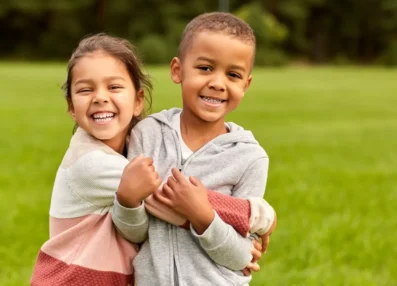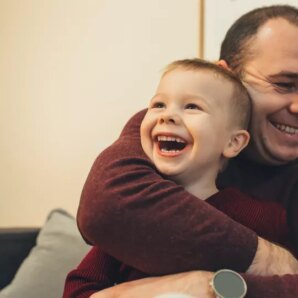Taking the first steps towards a bright future
Results day can be one of the most anxiety inducing times for a young person. We’re sharing some tips on how to make results day as positive an experience as possible, as well as sharing a foster parent’s guide to your young person’s next steps once they complete their education.

Understand their feelings
Whether the child in your care is anticipating their GCSE results, A-Levels or even their mock exam results, they’ll likely be feeling nervous about opening their envelope when the time comes. Encourage your young person to share how they’re feeling about results day and reassure them accordingly.
It’s normal to feel anxious about results day, but for some care experienced children these feelings may be heightened:
- Going through a challenging time in their personal lives may have an impact on their ability to do well at school.
- Some foster children may have an intense fear of failure or lack of self-belief due to their adverse childhood experiences.
- This pivotal event in their young lives may prompt them to feel anxious about their next steps as they approach becoming a young adult and aging out of foster care.
Some children in foster care experience Rejection Sensitivity Disorder (RSD) as a response to trauma. RSD makes it extremely difficult and upsetting to face feelings around failure, criticism or rejection. It’s important to approach results day with extra care and consideration of your foster child’s needs, making sure that you’re there to support them through the process.
Additional support before exams
Be sure to talk to your school before the exam season begins if you feel that the child in your care may be entitled to additional support. Mitigating circumstances may be applied for children who are experiencing significant distress in their personal lives during the exam period— for example, if they have recently come into your care due to the death of a caregiver.
If your foster child has a disability or additional need, talk to their school about accessing reasonable adjustments for their exam conditions. These might include additional time to complete an exam, short rest breaks, or being allowed to sit the exam in a private room.
Supporting your young person on results day
Taking care of their physical needs
Results day will likely be an emotionally taxing day no matter what results your young person gets. You can support their overall wellbeing and prepare them for the big day with the same advice you’ve likely been giving them while they were sitting their exams— to get plenty of sleep, eat well and stay hydrated.
Use positive self-talk
Fear of failure or limiting self beliefs can lead to us not giving our best effort if we already believe that we won’t succeed. Repeating positive self-affirmations can be a great way of helping our young people to overcome self-deprecating thoughts. Results day affirmations might include:
- ‘I’m feeling confident and calm about getting my results.’
- ‘I am proud of my achievements and how far I’ve come.’
- ‘My family are so proud of how hard I’ve worked on my exams.’
- ‘Whatever my results, my future is full of possibilities.’
- ‘My friends are feeling nervous too, and we’ll be there to support each other when we get our results.’
Though it may feel a little awkward in the moment, self-affirmations are backed by science and can have a positive impact on how we feel and behave. They can be practiced anywhere, at any time. Your young person could even record themselves repeating their affirmations and play them through their headphones while travelling to school on results day.
Plan for the future
One of the best ways you can help your young person is by planning for their future together. Having a plan in place for what their next steps will be, whether or not they achieve the grades they’re aiming for, can help to ease their fear of the unknown. Let them know that you’ll be there to support them whatever path they choose.
Share inspiring stories
Inspire your young person and show them how bright their future can be by sharing stories with them of young care experienced role models, such as BBC presenter Ashley John-Baptiste who struggled at school but went on to graduate from Cambridge University, and actor Barry Keoghan, star of ‘The Batman’ (2022), who left school at 16 to pursue his acting career and won the coveted role of The Joker. Success stories like these show young people in care that their future is limitless.
“I was at Cambridge University getting an esteemed award amongst some really clever people, and I just remember thinking, there’s nothing that looked after children can’t achieve… it’s not always going to be academia, for some kids it might be entrepreneurship, but we’ve all got talent. We’ve all got potential. We’ve all got something to contribute.”
-Ashley John-Baptiste, care experienced BBC Presenter
Be there for them on results day
On results day itself, you can offer your young person extra support in little ways. Perhaps prepare them their favourite breakfast, give them a good luck card or offer to pick them up from school or college if they feel that extra support would be welcome. Knowing that you’re with them on this big day and that you’re rooting for their success can help to ease their nerves.
Spend the evening together
You may choose to plan something fun for when they return home with their results, such as a special family meal or a movie night. This can give your young person something to look forward to, and can serve as a celebration if they’re pleased with their results or as a small way to help them to decompress after a hard day if things didn’t quite go the way they were hoping.
Celebrate their wins – both big and small
There’s no better feeling than seeing the children in your care achieve, and results day is the perfect time to celebrate them. A family day out, a small present or a trip to their favourite restaurant can be fantastic ways to reward your young person for their hard work and show them just how proud you are of their achievements.
When you have multiple children living at home, for example a child’s siblings, other foster children or your own children, it can be easy for them to become competitive or compare their results with those of their household. Make sure to be sensitive to this and celebrate each child’s individual success.
Remember, achievement will look different for every child. Some children may not get the highest grades, but your young person has undoubtedly overcome many challenges on the way to getting their results. If they’ve exceeded their previous targets, worked hard or have accomplished personal goals, that’s just as much of a reason to celebrate!
When things don’t go as hoped
Not getting the results they’d hoped for can be incredibly disheartening for your young person. Being upset or a little downtrodden is a natural response, and you may feel the same way as someone who cares deeply for them.
Your support at this time can be vital, especially if your young person feels like giving up. They may feel their whole future is riding on what’s written on that sheet of paper, but it’s important to remind them that their exam results are not everything. Remind them that there are thousands of successful people who struggled at school – one example being Richard Branson – and everyone has to find the path in life which best suits them. Show them how proud you are of their achievements and of how they’ve persevered, even if it wasn’t always an easy ride.
“The biggest reward is seeing children getting on, seeing them achieve great things. When some of the young people come to us, they’re in such a state of distress, so to hear they’re now running their own business or have gotten a degree, is fantastic and makes it all worth it.”
-Mike and Rose, Foster parents with Fosterplus

Planning for the future: our next step guide
Whether they choose further education, a traditional job or further training opportunities, there are options out there to suit every young person. Let’s explore some of the paths they may choose to take once finishing their exams.
Leaving School (16+)
It’s compulsory for all young people in the UK to remain in some form of education or training until they turn 18. Going to college or staying at Sixth Form gives young people plenty of opportunities to continue to learn, grow and achieve once their GCSEs are finished. Courses available include:
- A-Levels. A levels are ideal for kids who enjoy academia and classroom-based learning, or who are unsure of what they want to do as a job in the future. They’ll be able to choose three A-Levels in the subjects which interest them most, which can be a great path towards university.
- T-Levels. This new qualification focuses on one industry rather than a range of subjects. Learners will be based in the classroom while working at a placement in their industry, and it’s at the discretion of their employer whether they will be paid for their work. This is a great choice for kids who know exactly what career path they want to follow; just keep in mind that not all universities accept T-Levels.
- Apprenticeships. An apprenticeship can be taken up by any person aged 16+, and allows them to experience the world of work whilst earning a wage and gaining hands-on experience of their chosen career path. Apprenticeships involve one day a week of classroom-based learning, and can open up great job opportunities in the future.
- BTEC Qualifications. BTECs are vocational qualifications, and are a great choice for young people who prefer coursework over exams. BTEC qualifications are accepted by most universities; just keep in mind that the UK government is currently streamlining the amount of BTECs offered in favour of new T-Levels.
If your young person didn’t get their desired GCSE results…
If the child in your care hasn’t achieved a grade 4 pass in their English and Maths GCSEs, they will be required to re-sit these GCSEs or take functional skills courses alongside their chosen courses.
Further Education (18+)
While it can be difficult to see your older foster children growing up and moving on, it can also be an incredibly exciting time; there’s nothing more rewarding than watching them grow and achieve!
Some young people will be eager to go straight into the world of work once they turn eighteen, whereas others will decide to continue their formal education. Options available include:
- University. Going to university to study a Bachelor’s degree can be an amazing way of opening up a young person’s opportunities, learning new skills, making new friends and growing their independence, and care experienced students are also offered extra support. With hundreds of courses to choose from and the opportunity for further study, the future is limitless.
- Degree Apprenticeship. When your young person turns 18 they’ll have the opportunity to engage in a degree apprenticeship, which is a happy medium between an apprenticeship and university life. They’ll receive a salary for their work and, unlike standard degrees, they will not need to go into debt in order to get a Bachelor’s degree.
- Workplace Apprenticeship. Workplace apprenticeships are apprenticeships which are offered by your current employer. When your young person enters the world of work, they should always ask if their employer offers a workplace apprenticeship to enhance their skills. All of their studying will take place during normal working hours, and they will receive their usual full pay while learning.
If your young person didn’t get their desired A-Level results…
If your young person is disappointed by their A-Level (or equivalent) results and is disheartened to find that they have not been offered a place at University, you can be a pillar of support to them by helping them to go through the clearing process.
Clearing can be a stressful process as it involves calling various universities on results day to see if they have any places available. Once your young person has been offered a place through clearing, they’ll have 24 hours to accept. They may also have the option to re-sit their A-Levels, though this will involve completing another year of study.
How we’re supporting young people at Fosterplus
At Fosterplus, we love to celebrate the success of the young people in our care. We support them in a multitude of ways, including by ensuring that our foster parents receive excellent training tailored to their needs and by providing them with our young person’s hub where they can access information on a multitude of topics including bullying, online safety and life after foster care.
We’d like to wish good luck to all of the young people out there who are waiting on their results—we know you’ll achieve amazing things!






